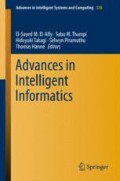Abstract
In this paper we describe the architecture of an e-learning environment that blends concept maps with Online Labs (OLabs) to enhance student performance in biology. In the Indian context, a secondary school student’s conceptual understanding of hard topics in biology is at risk because of a lack of qualified teachers and necessary equipments in labs to conduct experiments. Concept map provides a visual framework which allows students to get an overview of a concept, its various sub concepts and their relationships and linkages. OLabs with its animations, videos and simulations is an interactive, immersive approach for practicing science experiments. The blended e-learning environment was tested by systematically developing a concept map for the concept “Photosynthesis” and by successfully integrating it into the OLabs environment. Our blended approach to concept understanding has interesting implications for the teacher who is engaged in training programs.
Access this chapter
Tax calculation will be finalised at checkout
Purchases are for personal use only
Preview
Unable to display preview. Download preview PDF.
References
Shahaf, D., Guestrin, C., Horvitz, E.: Trains of thought: Generating information maps. In: Proc. 21st Int. Conf. World Wide Web, pp. 899–908 (2012)
Ritchhart, R., Turner, T., Hadar, L.: Uncovering students’ thinking about thinking using concept maps. Metacognition and Learning 4, 145–159 (2009)
Novak, J.D., Cañas, A.J.: The Theory Underlying Concept Maps and How to Construct and Use Them, pp. 1–36. IHMCC (2008)
Crampes, M., Ranwez, S., Villerd, J., Velickovski, F., Mooney, C., Emery, A., Mille, N.: Concept maps for designing adaptive knowledge maps. Inf. Vis. 5, 211–224 (2006)
Olney, A.M.: Extraction of Concept Maps from Textbooks for Domain Modeling. In: Aleven, V., Kay, J., Mostow, J. (eds.) ITS 2010, Part II. LNCS, vol. 6095, pp. 390–392. Springer, Heidelberg (2010)
Borda, E.J., Burgess, D.J., Plog, C.J., Luce, M.M.: Concept Maps as Tools for Assessing Students’ Epistemologies of Science. Electron. J. Sci. Educ. 13, 160–184 (2009)
Hao, J.X., Kwok, R.C.W., Lau, R.Y.K., Yu, A.Y.: Predicting problem-solving performance with concept maps: An information-theoretic approach. Decision Support Syst. 48, 613–621 (2010)
Gould, P., White, R.: Mental Maps. Penguin Books, New York 197
Tekkaya, C.: Remediating high schools’ misconception concerning diffusion and osmosis through mapping and conceptual change text. Res. Sci. Tech. Edu., 21, 5–16
Ajaja, O.P.: Concept Mapping As a Study skill: Effect on Students Achievement in Biology. Int. J. Sci. 3(1), 49–57 (2011)
Kowata, J.H., Cury, D., Silva Boeres, M.C.: Concept maps core elements candidates recognition from text. In: Proc. of Fourth Int. Conference on Concept Mapping, pp. 120–127 (2010)
Safayeni, F., Derbentseva, N., Cañas, A.J.: Concept Maps: A Theoretical Note on Concepts and the Need for Cyclic Concept Maps. Sci. Teach. 42, 741–766 (2005)
Bamidele, E.F., Oloyede, E.O.: Comparative Effectiveness of Hierarchical, Flowchart and Spider Concept Mapping Strategies on Students’ Performance in Chemistry. World J. Edu. 3, 66 (2013)
Starr, R.R., Parente de Oliveira, J.M.: Concept maps as the first step in an ontology construction method. Information Systems (2012)
Beel, J., Gipp, B., Stiller, J.-O.: Information retrieval on mind maps - what could it be good for? In: 2009 5th Int. Conf. Collab. Comput. Networking, Appl. Work (2009)
Derbentseva, N., Safayeni, F., Cañas, A.J.: Experiments on the effect of map structure and concept quantification during concept map construction. In: Proc. of First Int. Conference on Concept Mapping, pp. 209–216 (2004)
Corballis, M.: Visuospatial processing and the right-hemisphere interpreter. Brain and Cognition 53, 171–176 (2003)
Hagemans, M.G., Meij, H.D., Jong, T.D.: The Effects of a Concept Map-Based Support Tool on Simulation-Based Inquiry Learning. Jrnl. Edu. Psy. 105(1), 1–24 (2013)
Author information
Authors and Affiliations
Editor information
Editors and Affiliations
Rights and permissions
Copyright information
© 2015 Springer International Publishing Switzerland
About this paper
Cite this paper
Raman, R., Haridas, M., Nedungadi, P. (2015). Blending Concept Maps with Online Labs for STEM Learning. In: El-Alfy, ES., Thampi, S., Takagi, H., Piramuthu, S., Hanne, T. (eds) Advances in Intelligent Informatics. Advances in Intelligent Systems and Computing, vol 320. Springer, Cham. https://doi.org/10.1007/978-3-319-11218-3_14
Download citation
DOI: https://doi.org/10.1007/978-3-319-11218-3_14
Publisher Name: Springer, Cham
Print ISBN: 978-3-319-11217-6
Online ISBN: 978-3-319-11218-3
eBook Packages: EngineeringEngineering (R0)

